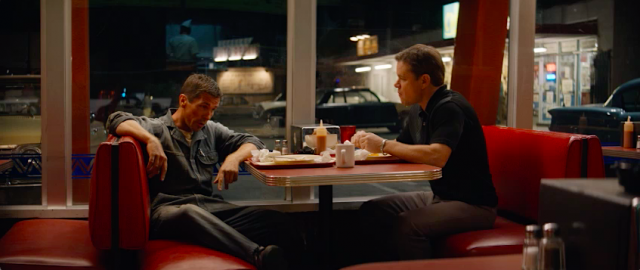Ford v Ferrari: Men at Work, by Scott Nye

James Mangold is not your, my, or anyone’s idea of an auteur, and yet he retains a sort of tenacious commitment to a certain type of movie. This type is a genre picture, and it’s just about the best damn genre picture you’ve ever seen, without being such a good genre picture as to be a great genre picture, because he knows all the perfect beats to hit without making them his own. This is why Logan is beloved by superhero fans and viewed more skeptically by the rest; despite all its superficial subversions, it never transcends its genre; it is what it is all the way. It’s also, paradoxically, why Walk the Line became the main point of parody for Walk Hard: The Dewey Cox Story; you couldn’t find a purer music biopic if you burned all the Rays and Bohemian Rhapsodys of the world into their raw matter and crushed them into a diamond.
Ford v Ferrari is as pure a racing film as there has ever been; even Ron Howard couldn’t muster this degree of anonymity when he made Rush. All that matters here are cars and family and winning and sticking it to those rich snobs and doing what men do which is build and race and choke back tears. There isn’t a line or moment that searches for anything else. There’s no psychology, there’s no why-do-men-do-what-they-do, there’s almost no romance, and the feeling is all embedded only gradually as these men do what men do. But if, as with Logan and superhero films, you love racing films, you couldn’t find a sweeter time at the movies. And I love racing films.
In the mid-60s, Henry Ford II (Tracy Letts) was intensely jealous of Enzo Ferrari. Enzo didn’t make better cars, or more cars, and was in fact going broke. But he won races. So Henry Ford II tried to buy Ferrari, but was outmaneuvered. Not content to simply make an unbelievable amount of money year in and year out, Ford decided to build a racing program and beat Ferrari at Le Mans, a legendary race in France that requires teams to drive for twenty-four hours. He didn’t care how much money he spent, he just wanted to win. So he hired Carroll Shelby (Matt Damon), who actually won Le Mans one year himself before retiring from racing for his health, to develop the car and program that will get them there.
But this Shelby guy, he’s got his own ideas, and he’s not going to bow down to this band of executives you parade out. No way. Because his favorite racer in the entire world is Ken Miles (Christian Bale), and this guy…he’s a bit of a wild card you see. I mean, he can race, no one is denying that. But can he learn to be a team player? Can he keep his opinionated mouth shut for once? Man, who can say. But boy can he race.
And that’s the movie. “Am I on fire?” Carroll yells at his pit crew in the film’s opening sequence, showing a bit from his winning race at Le Mans ‘59. His crew has no choice but to admit he’s not and let him continue along the track. Many other filmmakers would dive deep into what makes such a man tick. Mangold accepts him as he is, and tries to see the world as he sees it – a place to perpetually conquer, honor, and thrill. The relationship he builds with Ken contains not the heady romantic vibes in which Michael Mann or Howard Hawks would luxuriate, but rather simple camaraderie that is steadily resonant. Those filmmakers might insist that the relationship Carroll and Ken have is somehow deeper than that which Ken has with his family, but Mangold is not so subversive. He enjoys too much portraying a man who loves his wife (Caitriona Balfe, and who wouldn’t) and son and wants to give them all he has. They love him in return and want what’s best. Straightforward, unquestioning, emotionally rich yet uncomplicated.
The performances are heightened in that great old-fashioned movie way of putting on a personality that distinguishes each player from the ensemble. Is Christian Bale maybe pushing his limits there? Sure, but the character gives him license to do so, and he prances around the film with the same pompous energy as that infamous leaked audio from behind the scenes of Terminator: Salvation, and it’s about damn time we got that Christian Bale for an entire movie. Tracy Letts, as is now his custom, wrings a lot from single words. Matt Damon retains a certain rascally element underneath his friendly cool; Carroll is a salesman at this point, but there’s something corrupt about Damon that reminds us he’ll undermine the rules whenever he can. Ray McKinnon, as Carroll’s longtime right-hand man Phil, grounds the film and gives probably its finest performance, seemingly having walked straight off the side of the track and onto the film.
Its racing scenes aren’t the most insane thing you’ve ever seen, but they’re totally thrilling, whipping around and cutting to this terrific rhythm between the driver, the car, and the track, keeping the geography straight while conveying the rush of driving. There’s no stage work, no blue screen, it’s all people in cars actually zooming through the location. Cinematographer Phedon Papamichael, who will be the first to admit he’s not much of a craftsman – “I barely know where the on/off switch is on my camera and I don’t know anything about gamma curves, nor do I care about any of that,” he told Moviemaker Magazine – nevertheless captures these remarkable objects in motion from their perspective, harkening back to the work he did with Mangold on the severely-underrated action film Knight and Day. The switch to digital here allows for low-light sequences like a walk at dusk on an airplane runway, or the hazardous pitch-black high-speed racing at Le Mans. We feel what it means to barrell 200 miles per hour through the night when there’s almost nothing to see in front of you.
One could read into this scenario, of men negotiating the limits of corporate sponsorship in order to do the best job they can, a reflection of Mangold’s own work ethic, the constant need to prove his expertise to people who have none. That Mangold does not belabor their struggle is a testament to his own professionalism – for Carroll, and perhaps for the director, it’s all just part of what it takes to get the job done. Perhaps it is endemic to the American capitalistic sickness that we are so enamored of people who do their jobs well; so long as we’re tunneled in that, may we always be blessed to have directors who express it as well as James Mangold.






























